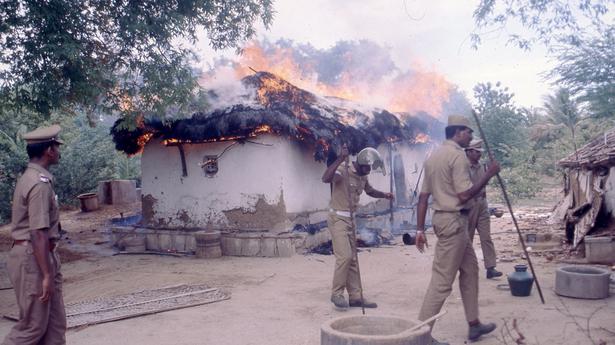
Remembering Melavalavu massacre
The Hindu
On June 30, 1997, two dalit panchayat heads from Melavalavu, a village about 30 km from Madurai city, were brutally murdered by a gang of armed caste Hindus merely for contesting and winning a local body election
In the incident that is well-remembered as a gruesome mockery of democracy and as one of the heinous casteist violence unleashed against the people belonging to the Scheduled Caste community in Tamil Nadu, a bus journey turned into a tragic end for the 35-year-old dalit panchayat president K Murugesan, 39-year-old dalit panchayat vice-president K. Mookan, and four of their aides. During the ride, they were brutally murdered by an armed gang of caste Hindus on this day (June 30), 25 years ago in Madurai district.
Why? Murugesan and Mookan, belonging to the Scheduled Caste were elected to the public office despite strong opposition from the dominant caste Hindus after declaring Melavalavu as a panchayat reserved for Scheduled Castes in September 1996.
The local body election that was scheduled to be held on October 9, 1996, was first put off due to withdrawal of nominations by all the three candidates including Murugesan due to threats and the second attempt in conducting the poll on December 28, 1996, was foiled due to booth-capture. It was during the third attempt on December 31, 1996 that Murugesan and Mookan were elected as president and vice president of the panchayat. The caste Hindus had boycotted it. Out of the total electorate of 4,433, only 716 votes were polled. Even after winning the election, Murugesan continued to face death threats and was prevented from entering his office. Following his representation to the then Chief Minister M Karunanidhi, Murugesan was provided with armed security at his office after which he started work.
Six months later, Murugesan, Mookan and their aides K. Chelladurai (45), O. Sevugamoorthy (45), K. Raja (22) and M. Boopathi (22) who were travelling from Madurai to Melavalavu in a bus on June 30 in 1997, were brutally hacked to death by a group of caste Hindus who were armed with sickles. The gang severed Murugesan’s head and threw it in a well that was about half-a-kilometre away from the crime scene.
Sending shock waves, the spine-chilling murder of the six SC men sparked violence as at least seven huts and a shop were repeatedly gutted and stone-pelting incidents took place in the village in Melavalavu the next day. The bodies of the six men were laid to rest on July 1 after being sent to their village in a convoy from the Government Rajaji Hospital in Madurai city following the autopsy. In four days since the murders, eight men were arrested under non-bailable sections of Indian Penal Code.
The then Chief Minister Karunanidhi, on July 4, strongly condemned the murders. He said: “The view that dalits should not occupy public offices such as the village panchayat president post is not acceptable in the present democratic age. It is also against the principle of equality to deny dalits the elected post in local bodies after creating reserved constituencies for them in the Assembly and Lok Sabha elections. And the act of murdering dalits who were elected to local bodies is unpardonable.”
Later on, in August 5, 1997 two members of the State Human Rights Commission (SHRC) — former judge of the Madras High Court K. Samidurai and former district judge R. Rathinasamy — visited Melavalavu and heard the grievances of the affected families. As on August 6, the Madurai rural police had arrested 17 persons in connection with the killings.











